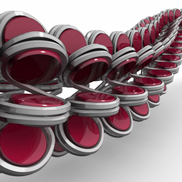
histone / histones

Supercoiled DNA wrapped around histone proteins (red).
Histones are a family of basic proteins that associate with DNA in the nucleus and help condense it into chromatin. Nuclear DNA does not appear in free linear strands; it is highly condensed and wrapped around histones in order to fit inside of the nucleus and take part in the formation of chromosomes.
Histones are basic proteins, and their positive charges allow them to associate with DNA, which is negatively charged. Some histones function as spools for the thread-like DNA to wrap around.
Under the microscope in its extended form, chromatin looks like beads on a string. The beads are called nucleosomes. Each nucleosome is made of DNA wrapped around eight histone proteins that function like a spool and are called a histone octamer. Each histone octamer is composed of two copies each of the histone proteins H2A, H2B, H3, and H4. The chain of nucleosomes is then wrapped into a 30 nm spiral called a solenoid, where additional H1 histone proteins are associated with each nucleosome to maintain the chromosome structure.
Further Exploration
Concept Links for further exploration
















